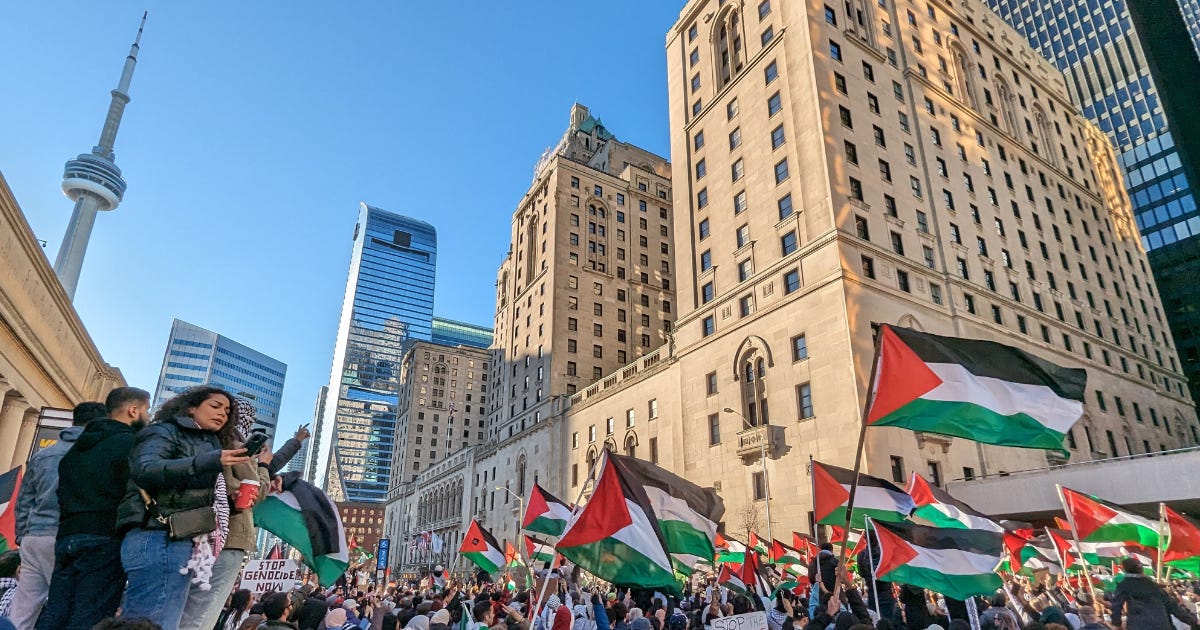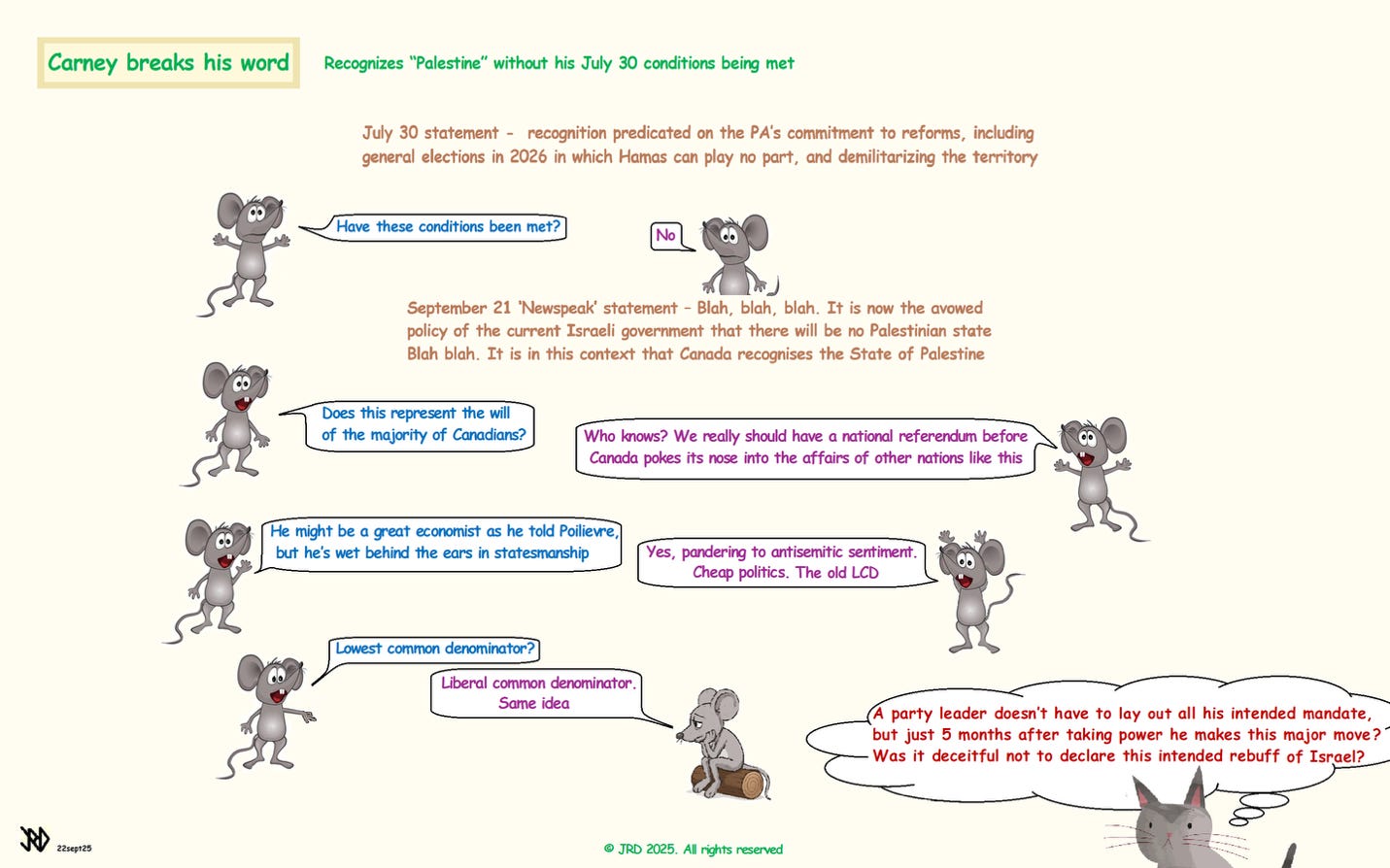OP-ED: The Palestinians don’t deserve a state of their own
Hymie Rubenstein writes, "This gratuitous move is best seen as a transparent political ploy to gain support from Canadians hostile to the existence of Israel."
By Hymie Rubenstein
The legal prerequisites for statehood, commonly known as the Montevideo criteria, are the widely recognised principles used to determine whether an entity qualifies as a state under international law. These criteria are derived from the Montevideo Convention on the Rights and Duties of States, adopted in 1933. According to the convention, a state should possess the following four elements: a defined territory; a permanent population; a functioning government; and a capacity to engage in normal diplomatic relations with other states.
Prime Minister Mark Carney arbitrarily and unilaterally announced Canada’s recognition of Palestine on September 21, bypassing Parliament and ignoring these preconditions, except a permanent population. He also placed other Gaza-specific conditions like the banishment of Hamas, establishment of a democratic government, and disarmament on the back burner.
Instead, this gratuitous move is best seen as a transparent political ploy to gain support from Canadians hostile to the existence of Israel.
Apart from its repudiation of the Montevideo Convention criteria, Carney’s decision ignores the elementary fact that there has never been an autonomous Palestinian state in human history or pre-history. Indeed, Palestinian identity surged in near lockstep opposition to the re-creation in 1947-48 of the modern state of Israel by the United Nations.
As the war between Israel and its many terrorist foes grinds on, two relentless myths never end: (1) the Palestinians have always wanted a state of their own and (2) Israel has always prevented the Palestinian people from achieving statehood.
Those myths are bolstered by the perennial cry that the Palestinians deserve a state of their own.
The myth of Israeli intransigence is groundless because Israel has acceded to Palestinian statehood on several occasions: 1937, 1947-1948, 1967, 2000-2001, and 2007. But whenever statehood was offered, it was soundly rebuffed by a Palestinian leadership and its regional and global supporters who rejected any two-state solution that would have allowed an Arab state next door to a Jewish one.
As Alan Dershowitz has recently stated:
“The Arabs of Palestine wanted to be part of Syria and be ruled over by a distant monarch. They simply could not abide the reality that the Jews of Palestine had created for themselves a democratic homeland pursuant to the League of Nations mandate and binding international law. Even if turning down the Peel proposal resulted in no state for the Arabs, that was preferable to allowing even a tiny, non-contiguous state for the Jews.”
Indeed, a refusal to share the land with the Jews is enshrined in the 2017 Hamas Charter which reads:
“Palestine, which extends from the River Jordan in the east to the Mediterranean in the West … is an integral territorial unit. It is the land and the home of the Palestinian people. The expulsion and banishment of the Palestinian people from their land and the establishment of the Zionist entity therein do not annul the right of the Palestinian people to their entire land and do not entrench any rights therein for the usurping Zionist entity.”
Another reason for questioning the statehood denial myth involves the belief that the Palestinians an ancient people who once had their own state that was stolen from them by other people, the latest one being the Jews of Israel.
Before Israel, there was a British mandate, not a Palestinian state; before the British Mandate, there was the Ottoman Empire, not a Palestinian state; before the Ottoman Empire, there were many other states and empires governing the disputed territories, including the kingdoms of Israel and Judah, not a Palestinian state.
More particularly, since the destruction of the second kingdom of Judea (the southern half of the alleged “occupied territories”) in the second century, the land the Roman conquerors re-named Syria Palaestina (to obscure Jewish association with the land of Israel) has been governed by one foreign power after another. The name Syria Palaestina disappeared, and “Palestine,” the Gentile name for the land of Israel, ceased to exist as a separate entity after it became part of the Arab-Muslim empire in 638.
In short, for nearly 13 centuries, from 638 to 1917 (when the British took charge following the collapse of the Ottoman Empire headquartered in Turkey), no separate administrative or socio-cultural entity called “Palestine” existed.
Indeed, the Ottoman Turks who ruled the Middle East from 1516 to 1917 regarded the geographical region of Palestine as part of Southern Syria. For most of human history, Palestine has only existed as a Western Christian term to describe the Jewish Holy Land and its Hebrew and Christian inhabitants. From the beginning of recorded history until nearly the present, neither foreigners nor residents recognized a unique people – other than the Jews themselves – called “Palestinians” living in a place called Palestine.
The absence before 1948 of a strong sense of Palestinian identity, apart from the occupation of lands that were always owned by outsiders such as the Ottoman Turks, is because there is no unique and separate Palestinian language, religion, nationality, or culture. The people who now call themselves Palestinians have done so only since the beginning of the 20th century because their primary sense of identity has always been tied to Arab Muslim ideology and membership localized lineages, clans, and tribal groups. A strong sense of pan-Arab identity and belief in Islam, not some fictitious ethnic identity, are what has always united the “Palestinians.”
None of this history has affected the widespread claim that, like all other peoples, the Palestinians deserve a state of their own.
But there are thousands of unique ethnic groups today — peoples with distinct languages, cultures, religions, and histories stretching back millennia — few of which have their own country. The Palestinians have a far weaker claim to statehood than most of these age-old ethnicities, including the predominantly Muslim Kurds whose 35-50 million people were denied a state of their but continue to live in exploited minority status in Turkey, Iran, Iraq, and Syria with hardly a word of outrage from the outside world.
The Palestinians, in turn, already have a state of their own — the Kingdom of Jordan — a dictatorship headed by an imported monarchy where they culturally form most of the population and where it is illegal for Jews to live.
In short, the Palestinian statehood claim is far less compelling than that of the Tibetans, Chechens, and other stateless groups like the Kurds. These other age-old ethnicities, unlike the Palestinians, have never been offered statehood, let alone repeatedly turning it down.
As for Israel, its disappearance is not going to happen. Until the so-called Palestinians and their regional and global enablers accept this reality, they will never be granted the statehood they hardly deserve.
Hymie Rubenstein, editor of REAL Indigenous Report, is a retired professor of anthropology at the University of Manitoba and a senior fellow at the Frontier Centre for Public Policy.




Canada won’t recognize Taiwan if you look on their Canada site Taiwan’s capital is called Taipei, China yet Canada recognizes Palestine- what bloody hypocrisy is this? What dark forces are at play?
I am ashamed of the liberal government and their ideological motives.
This is the best explanation I have ever read. And it makes sense!